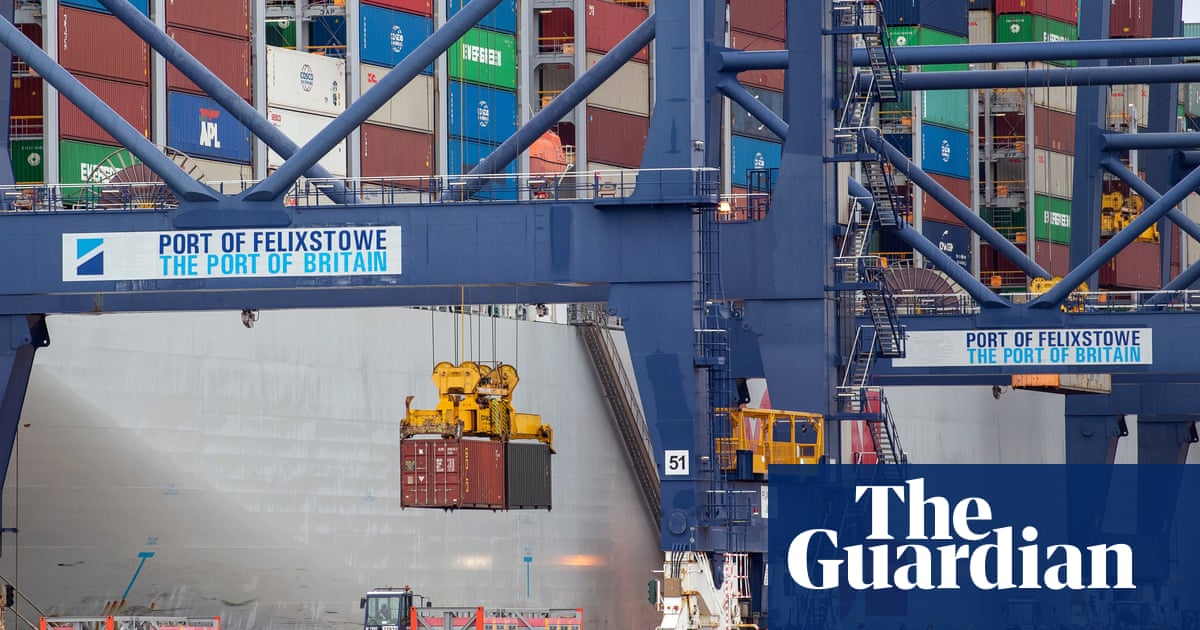
A minister has told British businesses that “some friction” when trading with the EU after Brexit is the price to pay for being a sovereign state again.
On the fourth anniversary of Britain officially leaving the EU, Andrea Leadsom said UK firms should “adapt” to the change in trade rules, after new checks were brought in on food, drink and some agricultural products, suggesting they should not buy goods from Europe.
When asked what the successes of Brexit were, Leadsom, a health minister and fierce Brexiter, told Nick Ferrari on LBC: “I’m hugely delighted at Brexit. We have our sovereignty back, we’re in control of our money, laws and borders. The NHS has considerably more than £350m a week and we’ve signed up to 70 trade deals.”
But after hearing of the difficulties a British florist faced when trying to import flowers from the Netherlands because of the additional checks, Leadsom told Sky News: “Leaving the single market was always going to have implications … I’m just saying that businesses need to adapt to meet the changing environment.
“I can certainly remember as business secretary myself back in 2019, every day meeting with businesses, roundtables, to help them to prepare for us actually leaving the European Union and to understand the additional checks that would be required.
“So businesses are used to the costs of doing business. I understand that today is a big news story because it is something that finally has come home to roost. But the fact of the matter remains that businesses have huge opportunities with other parts of the world which are the direct benefit of us leaving the European Union.”
Speaking about trading relations, the minister told Times Radio: “What that does mean is that there is some friction in trade. However, we also have huge trading arrangements with other countries around the world … so there is a huge new opportunity for the UK at the same time as continuing to trade, albeit with some friction, which is the price you pay for leaving the single market and for being a sovereign state again.”
On the eve of the new arrangements coming into force, the Commons environment, food and rural affairs committee wrote to the environment secretary, Steve Barclay, expressing concerns over the new post-Brexit checks.
The committee chair said: “We remain concerned about the location of the physical checks that will be undertaken for commercial loads,” adding that it posed “potentially serious biosecurity risks” to the UK.
Goods from Britain have faced similar controls from the EU since it left the bloc’s single market at the start of 2021, but the UK has repeatedly put off checks in the other direction.
Ministers have sought to allay concerns as the new post-Brexit checks on food and drink imports come into force.
The long-delayed rules are part of the UK government’s introduction of a series of checks this year.
Fears have been expressed about disruption to supply chains, with MPs also warning that the new border regime could present “serious biosecurity risks” to the UK.
The home secretary, James Cleverly, played down the concerns, saying there would be “no interruption” to food on supermarket shelves as a result of the new rules.
Noting the anniversary of Britain’s official departure, a leading French MEP said “nothing has been a success” since.
Valérie Hayer, the president of the Renew Europe group in the European parliament, wrote: “All the polls since show the drama created by Brexit.
“Purchasing power, social security, global influence, border protection: nothing, absolutely nothing, has been a success.
“The populists lied to the British.”












